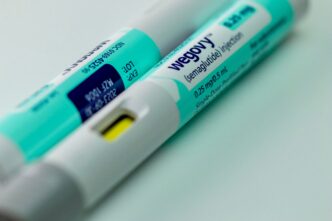Executive Summary
The Story So Far
Why This Matters
Who Thinks What?
The Trump administration announced two deals on Thursday, November 6, 2025, with pharmaceutical companies Eli Lilly and Novo Nordisk, designed to significantly reduce the cost of certain blockbuster obesity drugs to as little as $149 per month and expand Medicare coverage for eligible enrollees. The agreements, made public from the Oval Office, are part of the administration’s broader push to lower drug prices, offering drugmakers incentives such as tariff breaks on imported pharmaceutical products and expedited regulatory review for specific medicines.
Drug Pricing Details
Under the new arrangements, the prices consumers pay will vary based on their insurance coverage and purchasing method. For those buying injectable GLP-1 medications directly from the companies, the initial cost will average $350 per month, with a commitment from drugmakers to reduce this to approximately $250 over the next two years.
Should oral GLP-1 tablets receive approval from the U.S. Food and Drug Administration, the lowest dose is projected to cost $149. These reduced prices will become available with the launch of TrumpRx, the administration’s direct-to-consumer website, in early 2026.
Currently, Novo Nordisk offers a direct-to-consumer option for Ozempic and Wegovy at $499 a month, while Eli Lilly’s Zepbound has cash-pay options starting at $349 a month.
Expanded Medicare Coverage
Eligible Medicare enrollees will benefit from a $50 copay for certain GLP-1 medications approved for both obesity and diabetes, effective mid-2026. The drugmakers have agreed to reduce the prices Medicare pays to $245, which will help fund the expanded coverage for weight loss drugs.
The administration is broadening access to obesity drugs for Medicare enrollees with specific medical conditions. This includes individuals who are overweight with prediabetes, have experienced a stroke or other cardiovascular disease, or have obesity combined with diabetes or uncontrolled high blood pressure and severe obesity.
Approximately 10% of Medicare enrollees are expected to be eligible for this expanded access. This initiative contrasts with a previous Biden administration proposal to reinterpret the statute to allow coverage for obesity as a chronic disease, an effort Trump officials halted, citing the lack of included price cuts in the prior proposal.
Medicaid and Broader Initiatives
Eli Lilly and Novo Nordisk have also committed to providing these medications at lower prices to state Medicaid programs. The implementation timeline for these reductions will depend on individual negotiations with each state.
President Trump has revived his “Most Favored Nation” initiative in his second term, aiming to align U.S. drug prices with those in other developed countries. His current strategy focuses on voluntary agreements with drugmakers, offering incentives in exchange for price reductions. GLP-1 medications have been a particular focus due to their increasing popularity for weight loss and chronic condition management.
Notably, Ozempic and Wegovy were selected in January for a second round of Medicare drug price negotiations, which is anticipated to yield further savings for the program and potentially for enrollees, depending on their individual drug coverage.
Key Takeaways
The Trump administration’s new deals with Eli Lilly and Novo Nordisk represent a significant policy shift aimed at making certain obesity drugs more affordable and accessible. By leveraging incentives and direct negotiations, the administration seeks to lower out-of-pocket costs for consumers and expand Medicare coverage for a targeted population, while also securing price reductions for state Medicaid programs.








